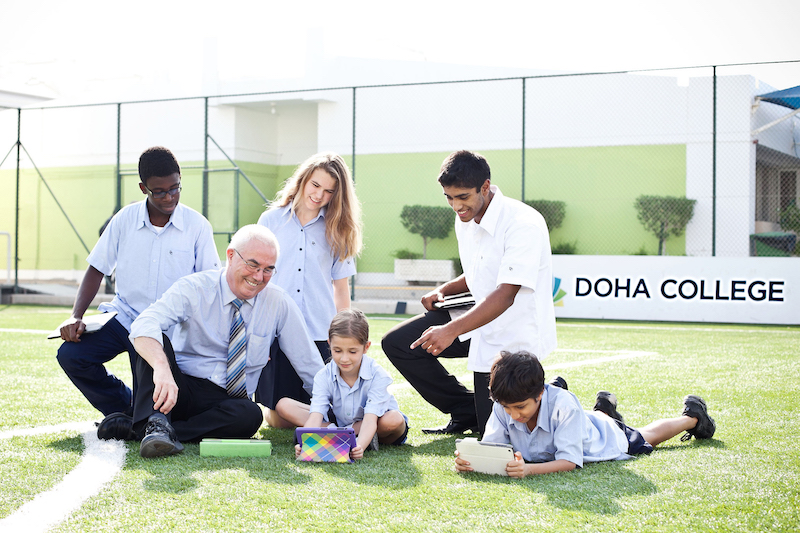Can you boost attainment by celebrating success?
Posted on 3rd May 2017 in School News, Curriculum, Qatar
Yes you can, says Paul Young, Senior Vice Principal and Head of Secondary at Doha College, Qatar...
For many of us working in international schools, finding effective ways to boost the attainment of a transient student population can be par for the course. At Doha College, we endeavour to ensure that every one of our students reaches their full potential. But not knowing if they’ll be with us for six months, or the full duration of their studies – or anything in between – certainly adds an additional edge. Foremost in our minds is the question of how we can provide all our students with the support they need to make good progress – regardless of how long they are with us.
The school welcomes 1800 children, between the ages of 3 and 18, from 90 different nationalities. Our aim is to ensure learning targets are put in place, based on each individual’s starting point, that are aspirational enough to challenge and inspire. After all, standards here are high. Many of our students are accepted at top universities around the world including Oxford, Cambridge, Yale and Harvard.
So how do we make sure every student’s time with us really counts? We’ve found a careful calibration of monitoring progress and attainment from day one, plus looking at different ways of encouraging each child to give their best, helps to ensure that our students achieve all they are capable of. Our six steps to success are as follows:
1. Benchmarking
As is the case in many international schools, a child can start at any point of the school year, in any age group, from any educational background – so the first stage is to benchmark the children when they join us. We’ve found that using a cognitive ability test – one that isn’t tied to any particular curriculum – is a very useful starting point.
2. Target setting
With a clear point of reference established, it’s time to set appropriate targets for our students to aim for, using a mix of assessment results and teachers’ professional judgement. Our Heads of Department will adjust these targets as and when they see fit, to ensure they strike the right balance between challenge and aspiration.
3. Monitoring progress
Details of all our students’ achievement are recorded and stored electronically in our management information system (we use SIMS), and a simple traffic light system of red, yellow and green bandings makes it easy for teachers and senior leaders to see who is working at what level and spot when we need to step in. The data help us to see quickly if, for instance, Emily is falling behind in English or Sumiko might benefit from some extension work in maths, so we can put the right support into action and track its impact. Since many of our students are high achieving, we’ve added another colour – ‘Doha College Blue’ – to our traffic light system for those who are on track to exceed their targets by the end of the school year.
4. Raising expectations
When it comes to monitoring students’ grades, we not only keep an eye on A* to C grades, but track A* to A, and A* to B grades too. This has two advantages. Firstly, it encourages a little bit of friendly competition between departments, which can have quite a positive impact on achievement. Secondly, as part of Doha College’s mentoring programme our staff meet once a week with any student who is identified as not on track to achieve 5 A* to B grades. These meetings give students and staff the chance to discuss any issues, and provide the opportunity to identify areas for revision. This is often enough to encourage the student to aim high as they work towards achieving their full potential.
5. Rewarding every effort
Along with the monitoring of current attainment, at Doha College we are keen to encourage effort. This approach can be a great motivator for students. Our teachers award effort grades in each subject; 3 is excellent, 2 is very good and 1 is good. An average score is then worked out from each student’s cumulative total, which is tracked by our Heads of Year to see if effort has increased – or not. Effort scores also trigger a number of House points, which contribute to the overall House competition.
6. Celebrating success
Our experience is that celebrating success encourages success, and students respond really well to the recognition they receive. Each year, our highest achieving students are invited to participate in a prestigious event, where they personally receive a paper report and a hand-written letter of congratulations from the Principal. We usually produce electronic reports, but this is an occasion where students truly value the paper-based approach.
We know our focus on encouraging and celebrating success resonates with our students. When we hold our Celebration Evening after examinations, they often tell us it’s one of the things they most value during their time at Doha College. We’ve even had students travel back from other parts of the world just to pick up their certificates.
Challenge, aspiration and effort
In my view, there are no shortcuts to success. We have found that adopting a blended focus on challenge, aspiration and effort means that every child progresses during their time at the school. Ultimately, rewarding effort is a key part of our strategy for encouraging high attainment amongst our students and it works as an educational strategy. While the ability of students at Doha College has been consistent since 2008, results are improving all the time – success, by anyone’s standards.
Paul Young is Senior Vice Principal and Head of Secondary at Doha College, Qatar.
This article first appeared in the 19.2 issue of International School magazine. To view current and past issues, visit www.is-mag.com